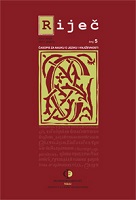Kondicionalne rečenice u crnogorskom jeziku u svijetlu kognitivno-lingvističke teorije i konstrukcione gramatike
Conditional Sentences in Montenegrin within The Framework of Cognitive Linguistics and Construction Grammar
Author(s): Nataša KostićSubject(s): Cognitive linguistics, South Slavic Languages, Philology
Published by: Filološki fakultet, Nikšić
Keywords: Montenegrin; conditional sentences; cognitive linguistics; construction; cognitive domain; epistemicity;
Summary/Abstract: The paper presents syntactic and semantic analysis of conditional sentences with neutral epistemic stance in Montenegrin using the model that embraces theoretical assumptions of Cognitive Linguistics, Construction Grammar and Relevance Theory. Conditional sentence is viewed as an example of a construction as defined in cognitive approaches to language, i.e. as conventional pattern of linguistic structure which is paired with features of interpretation. These features can be of syntactic, semantic and/or pragmatic nature. Analysis of a large number of Montenegrin conditional sentences reveals parameters of constructional meaning, such as verb forms, conjunctions, type of relation between clauses of conditional sentence, as well as ways in which they contribute to overall interpretation of the conditional sentence. The most important results of the analysis suggest that Montenegrin conditional sentences exhibit meaning extensions from concrete relations, such as causality in real world domain, towards more abstract relations, such as logical and pragmatic. This means that causal predictive conditionality should probably be viewed as a center from which semantic extension occurs to epistemic and speech act domains.
Journal: Riječ
- Issue Year: 2011
- Issue No: 5
- Page Range: 29-48
- Page Count: 20
- Language: Montenegrine

